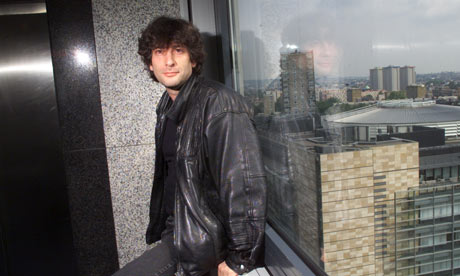
Science fiction author Adam Roberts is cross with science fiction fans. The line-up for this year's Hugo awards – selected and voted for by readers – isn't very good, he says, and he's not pleased.
"What do these lists say about SF to the multitude in the world - to the people who don't know any better? It says that SF is old-fashioned, an aesthetically, stylistically and formally small-c conservative thing. It says that SF fans do not like works that are too challenging, or unnerving; that they prefer to stay inside their comfort zone," Roberts writes, before going on to criticise the five-strong shortlist for this year's best novel award.
Little Brother by Cory Doctorow: "a mediocre piece of writing: stylistically dull; too formally stilted in execution; too monologic tonally".
Saturn's Children by Charles Stross: "as scattershot a novel as any Stross has written ... I suppose it could be argued that Saturn's Children's take on late Heinlein tries something new with the form of the novel, if rattling the form to pieces with a hail of bolts and screws counts as new. But it's pretty weak fare."
Zoe's Tale by John Scalzi: "pleasant but mediocre".
The Graveyard Book by Neil Gaiman: "twee, too cosy".
Anathem by Neal Stephenson: "enormous and deranged and so boring it goes through boring into some strange condition on the far side".
The novels on the Hugo shortlist – apart from Anathem, which Roberts feels should be on the shortlist despite his dislike for it ("I think it fails, but I think it fails in heroic, mad, reader-stretching, you've-never-come-across-anything-like-this-before ways") – are all old-fashioned, he says: "formally, stylistically and conceptually unadventurous". Where's The Quiet War, House of Suns, Song of Time? he asks. Where are the books trying something new?
It's the same old chestnut of whether book prizes should be decided by popular vote or by jury, as some commentators point out in a furiously debated comment section on Roberts's blog. Damien G Walter, of this blog parish, gets involved (and casts his vote for Gaiman); he says there isn't any problem with the Hugos: they're "the most successful novels of the year, by the most successful authors of the era".
One fan takes offence: "Having been insulted by you, since I voted for the Hugos this year, I don't think I'll be picking up anything with your name on it in the bookstore in the future," he tells Roberts. "I have friends, we all like SF books of various stripes and genres, and we can put our combined money behind authors who don't engage in petty flailing on the internet." Take that, Roberts!
I tend to agree with Roberts that this year's line-up is rather predictable, just as the selections are for other reader-voted awards – the David Gemmell Legend prize for fantasy, the Theakstons Old Peculiar crime award. While I do feel it's appropriate to have literary awards voted for by readers – the democratic approach – as well as by judges – the dictatorial – as Roberts says, the Hugos are the genre's most prestigious award, so their shortlist is a showcase for SF, and should therefore represent the best of the best. Is the solution, as he feels, to encourage fans to vote for better books, or would it be to close the voting to a small field of experts?

